SPECIAL JULY 2021 - COPIES 500
Why are Cubans protesting? Examining the nation’s disappointment with the Communist Party
Police are out in force tonight in Havana,
Cuba, after thousands of protesters rose up Sunday, taking to the
streets across the country in the largest demonstrations against
communist rule in a generation. Nick Schifrin begins our coverage, and
talks to Lillian Guerra, a professor of Cuban history at the University
of Florida, about the country's political developments.
Read the
Full Transcript
Judy Woodruff:
In Cuba, police are out in force
tonight in the capital, Havana, after thousands of protesters rose up Sunday.
They took to the streets across the
country, in the largest demonstrations against communist rule in a generation.
Nick Schifrin begins our coverage.
Nick Schifrin:
On the streets of Havana, thousands
of Cubans walked to the center of the capital to demand their freedom.
Geovanis Gonzales (through
translator):
We are here because of the
repression against the people. They are starving us to death. We have no house.
We have nothing. But they have money to build hotels.
Pedro Del Cueto (through
translator):
Homeland and life. Down with the
dictatorship. Down with the Castros. Down with the communist dogs.
Nick Schifrin:
They filmed on their phones and
spread the call to demonstrate via Internet they have only recently been able
to access, first San Antonio de los Banos, south of Havana, and then to
hundreds of cities throughout the country.
It wasn't all peaceful. Ninety
miles east of Havana, protesters overturned a cop car. In response, police
arrested dozens, and plainclothes officers administered the state's justice.
Michel Rodriguez (through
translator):
State security beat me and my
daughter. They beat us because we were walking down the street.
Nick Schifrin:
The nationwide release of anger
from protesters willing to personally yell at Cuba's president, the product of
acute shortages of COVID vaccines and other medicines, despite a COVID
outbreak, and more Cubans getting sick, anger over inflation that could hit 500
percent this year.
And because of Trump administration
sanctions, Cubans no longer have access to remittances that were once their
second largest source of income. But it's also the product of longstanding
outrage over an economy that for years failed to lift up working-class Cubans.
Yesterday, Cuban President Miguel
Diaz-Canel accused demonstrators of being U.S. sellouts. Today, he blamed the
70-year-old U.S. trade embargo.
Miguel Diaz-Canel (through
translator):
Lift the blockade, and we will see
what our people are capable of.
Nick Schifrin:
But in the White House today, President
Biden took the protesters' side.
President Joseph Biden:
The Cuban people are demanding
their freedom from an authoritarian regime. The United States stands firmly
with the people of Cuba as they assert their universal rights.
And we call on the government, the
government of Cuba, to refrain from violence.
Nick Schifrin:
It's been 27 years since Cubans
protested en masse. But those demonstrations were only in Havana. Yesterday's
protests were across the country, spontaneous, and leaderless.
And to talk about the significance
of these protests, we turn to Lillian Guerra, professor of Cuban history at the
University of Florida.
Lillian Guerra, welcome to the
"NewsHour."
So, how historic were yesterday's
demonstrations?
Lillian Guerra:
Well, they were really
unprecedented.
We have not seen anything like this
in 60 years or more in Cuba. They are not just extraordinary in their
magnitude, but they are also geographically vast in terms of the numbers of
cities and places where they have taken place.
And the quality of people's
denunciation, the diversity of voices, but also that people are openly calling
this a dictatorship, and today even calling for the end of communism openly in
Holguin, which is far eastern Cuba, this is all really uncharted waters.
Nick Schifrin:
We reported some of Cubans' most
recent concerns over COVID, over medical shortages, inflation, but also
long-term economic hopelessness.
What do you think lead to
yesterday's demonstrations?
Lillian Guerra:
I think this is a culmination of
three decades of the Cuban government making reforms that really have most
served its own stabilization and consolidation of control over the capitalist
sector of the economy that was created by the Communist Party in 1991, really
because of the collapse of the Soviet Union and the need to do something to
maintain power.
So what we have is a lot of anger.
We have now multigenerational disappointment with the lack of change. And, most
recently, we have a lot of hypocrisy on the part of the Cuban state that claims
it is so humanitarian and so interested in its people's welfare, but really has
not even been able to supply people with Tylenol and basic food, and also will
not admit — and that is the real — the key here, that the new leadership and
the old leadership have held hands.
And they will not admit that
anything is wrong with their model or their one-party rule.
Nick Schifrin:
And, in fact, today, we have seen
the Cuban government blamed United States for these protests, also shut off
some access to the Internet.
Do you believe the government is
willing to make some of the changes that are required to respond to those
longer — more medium- and long-term concerns expressed by the population?
Lillian Guerra:
I think that they are very
unwilling.
In April, the Cuban Communist Party
held its latest Congress. They said at the Congress that they were committed to
the idea that social media and the Internet and all the means by which Cubans
are expressing them are an affront to the nation, that they are anti-Cuban and
that they are a source of subversion.
So, that was several months ago,
yes, but, so far, the tune has not changed. And the story line has pretty much
gotten narrower, as Miguel Diaz-Canel has gone on television accusing those
protesting of being vulgar criminals, of being mercenaries.
And none of that is believable. The
people who are protesting are your neighbors, the people you know. There are
people of all backgrounds. And the diversity of that community of Cubans in
every place that they are protesting makes it really difficult for this to be
discredited according to the traditional means.
Nick Schifrin:
Candidate Biden promised to lift
some of the Trump administration actions on Cuba. The Biden administration is
close to finalizing its Cuba policy.
Let me play you a clip from an
interview I did earlier today with Mike Gonzalez. He's a Heritage Foundation
senior fellow who says, after these protests, the Biden administration should
not open up to the Cuba.
Mike Gonzalez:
I think this is now off the table,
because it will be widely seen and it will be a lifeline to a thuggish,
murderous totalitarian regime that has been rejected by its own people.
So I don't see how Biden can send
back an ambassador or lift punitive measures that Trump imposed.
Nick Schifrin:
Lillian Guerra, what do you think
the Biden administration should do following yesterday's protests?
Lillian Guerra:
I really think that they should do
the opposite of what this gentleman just suggested.
If he were to take a position of
loosening the embargo or doing the kinds of things that Obama did that really
poked holes into it, that would really call the Cuban state's bluff. I mean,
all I can say is that everything that is going wrong in Cuba is the result of
the United States and the United States' blockade, as they call it, the
embargo, when Cubans on the ground know that it's really what they say is the
internal blockade.
I mean, that phrase has been used
now for more than 30 years to describe the kinds of controls that the Communist
Party exercises. And so I think we need to stop being the aggressor. We need to
stop taking on the scripted role that has been our role since 1960, at least
1961. It's time to be a radical friend of the Cuban people, even as we maintain
our criticisms and perhaps some of our sanctions certainly against the
Revolutionary Armed Forces.
Nick Schifrin:
And that debate over U.S. policy continues.
Lillian Guerra, thank you very much.
Lillian Guerra:
Thank you.


Why are Cubans protesting? Examining the nation’s disappointment with the Communist Party
Police are out in force tonight in Havana, Cuba, after thousands of protesters rose up Sunday, taking to the streets across the country in the largest demonstrations against communist rule in a generation. Nick Schifrin begins our coverage, and talks to Lillian Guerra, a professor of Cuban history at the University of Florida, about the country's political developments.
Read the Full Transcript
Judy Woodruff:
In Cuba, police are out in force tonight in the capital, Havana, after thousands of protesters rose up Sunday.
They took to the streets across the country, in the largest demonstrations against communist rule in a generation.
Nick Schifrin begins our coverage.
Nick Schifrin:
On the streets of Havana, thousands of Cubans walked to the center of the capital to demand their freedom.
Geovanis Gonzales (through translator):
We are here because of the repression against the people. They are starving us to death. We have no house. We have nothing. But they have money to build hotels.
Pedro Del Cueto (through translator):
Homeland and life. Down with the dictatorship. Down with the Castros. Down with the communist dogs.
Nick Schifrin:
They filmed on their phones and spread the call to demonstrate via Internet they have only recently been able to access, first San Antonio de los Banos, south of Havana, and then to hundreds of cities throughout the country.
It wasn't all peaceful. Ninety miles east of Havana, protesters overturned a cop car. In response, police arrested dozens, and plainclothes officers administered the state's justice.
Michel Rodriguez (through translator):
State security beat me and my daughter. They beat us because we were walking down the street.
Nick Schifrin:
The nationwide release of anger from protesters willing to personally yell at Cuba's president, the product of acute shortages of COVID vaccines and other medicines, despite a COVID outbreak, and more Cubans getting sick, anger over inflation that could hit 500 percent this year.
And because of Trump administration sanctions, Cubans no longer have access to remittances that were once their second largest source of income. But it's also the product of longstanding outrage over an economy that for years failed to lift up working-class Cubans.
Yesterday, Cuban President Miguel Diaz-Canel accused demonstrators of being U.S. sellouts. Today, he blamed the 70-year-old U.S. trade embargo.
Miguel Diaz-Canel (through translator):
Lift the blockade, and we will see what our people are capable of.
Nick Schifrin:
But in the White House today, President Biden took the protesters' side.
President Joseph Biden:
The Cuban people are demanding their freedom from an authoritarian regime. The United States stands firmly with the people of Cuba as they assert their universal rights.
And we call on the government, the
government of Cuba, to refrain from violence.
Nick Schifrin:
It's been 27 years since Cubans protested en masse. But those demonstrations were only in Havana. Yesterday's protests were across the country, spontaneous, and leaderless.
And to talk about the significance of these protests, we turn to Lillian Guerra, professor of Cuban history at the University of Florida.
Lillian Guerra, welcome to the "NewsHour."
So, how historic were yesterday's demonstrations?
Lillian Guerra:
Well, they were really unprecedented.
We have not seen anything like this in 60 years or more in Cuba. They are not just extraordinary in their magnitude, but they are also geographically vast in terms of the numbers of cities and places where they have taken place.
And the quality of people's denunciation, the diversity of voices, but also that people are openly calling this a dictatorship, and today even calling for the end of communism openly in Holguin, which is far eastern Cuba, this is all really uncharted waters.
Nick Schifrin:
We reported some of Cubans' most recent concerns over COVID, over medical shortages, inflation, but also long-term economic hopelessness.
What do you think lead to yesterday's demonstrations?
Lillian Guerra:
I think this is a culmination of three decades of the Cuban government making reforms that really have most served its own stabilization and consolidation of control over the capitalist sector of the economy that was created by the Communist Party in 1991, really because of the collapse of the Soviet Union and the need to do something to maintain power.
So what we have is a lot of anger. We have now multigenerational disappointment with the lack of change. And, most recently, we have a lot of hypocrisy on the part of the Cuban state that claims it is so humanitarian and so interested in its people's welfare, but really has not even been able to supply people with Tylenol and basic food, and also will not admit — and that is the real — the key here, that the new leadership and the old leadership have held hands.
And they will not admit that anything is wrong with their model or their one-party rule.
Nick Schifrin:
And, in fact, today, we have seen the Cuban government blamed United States for these protests, also shut off some access to the Internet.
Do you believe the government is willing to make some of the changes that are required to respond to those longer — more medium- and long-term concerns expressed by the population?
Lillian Guerra:
I think that they are very unwilling.
In April, the Cuban Communist Party
held its latest Congress. They said at the Congress that they were committed to
the idea that social media and the Internet and all the means by which Cubans
are expressing them are an affront to the nation, that they are anti-Cuban and
that they are a source of subversion.
So, that was several months ago, yes, but, so far, the tune has not changed. And the story line has pretty much gotten narrower, as Miguel Diaz-Canel has gone on television accusing those protesting of being vulgar criminals, of being mercenaries.
And none of that is believable. The people who are protesting are your neighbors, the people you know. There are people of all backgrounds. And the diversity of that community of Cubans in every place that they are protesting makes it really difficult for this to be discredited according to the traditional means.
Nick Schifrin:
Candidate Biden promised to lift some of the Trump administration actions on Cuba. The Biden administration is close to finalizing its Cuba policy.
Let me play you a clip from an interview I did earlier today with Mike Gonzalez. He's a Heritage Foundation senior fellow who says, after these protests, the Biden administration should not open up to the Cuba.
Mike Gonzalez:
I think this is now off the table, because it will be widely seen and it will be a lifeline to a thuggish, murderous totalitarian regime that has been rejected by its own people.
So I don't see how Biden can send back an ambassador or lift punitive measures that Trump imposed.
Nick Schifrin:
Lillian Guerra, what do you think the Biden administration should do following yesterday's protests?
Lillian Guerra:
I really think that they should do the opposite of what this gentleman just suggested.
If he were to take a position of loosening the embargo or doing the kinds of things that Obama did that really poked holes into it, that would really call the Cuban state's bluff. I mean, all I can say is that everything that is going wrong in Cuba is the result of the United States and the United States' blockade, as they call it, the embargo, when Cubans on the ground know that it's really what they say is the internal blockade.
I mean, that phrase has been used now for more than 30 years to describe the kinds of controls that the Communist Party exercises. And so I think we need to stop being the aggressor. We need to stop taking on the scripted role that has been our role since 1960, at least 1961. It's time to be a radical friend of the Cuban people, even as we maintain our criticisms and perhaps some of our sanctions certainly against the Revolutionary Armed Forces.
Nick Schifrin:
And that debate over U.S. policy continues.
Lillian Guerra, thank you very much.
Lillian Guerra:
Thank you.
ABOVE VIDEO: Thousands of Cubans took to the streets to protest the government.
(FOX NEWS) – Video emerged on social media Sunday showing anti-government protesters in Cuba holding an American flag during their effort to end the country’s communist dictatorship blamed for the worsening conditions.
Giancarlo Sopo, a communication strategist who, according to the Federalist, once worked on former President Trump’s re-election campaign, tweeted a video of protesters holding an American flag while they marched.
“This is deeply moving,” he posted. “Watch as Cubans wave American flag while marching against the island’s 62 year-old communist dictator on the streets of Havana. Never forget what America represents to millions across the world.”
Rep. Byron Donalds, R-Fla., also tweeted, “Protesters in America: Burn the US Flag, a symbol of freedom, liberty, & justice—ideals that EVERY American possesses but so often ignore. VS. Protesters in Cuba: Fly the America Flag & are willing to die for the freedom, liberty, & justice that’s synonymous with the USA.”
CLICK HERE TO READ FULL ARTICLE ON FOX NEWS
What is communism?
Fact 1
The German scholars Karl Marx (1818–1883) and Friedrich Engels
(1820–1895) founded the communist ideology. Communism, the social
formation that was to follow capitalism, was to be built after a violent
worldwide revolution starting from the most highly developed capitalist
countries.
Fact 2
The first requirement of building communism after the revolution
was the confiscation of the property of members of the ‘exploitative’
classes and their suppression, deportation, imprisonment and physical
destruction, often together with the members of their families.
Fact 3
The Eastern Bloc disintegrated together with the collapse of the
Soviet Union in 1989–1991. Communist parties did not come to power as a
result of the democratic process nor did they succeed in retaining
power when democracy was restored.
Communism is a political ideology born in the
19th century that set as its objective the building of a classless
society in which all means of production and all that is produced is
owned in common by all members of society. Private property is replaced
by public property. Communism is totalitarian by its nature. Its
objective was the subjugation of the whole of society to ideology and
the exclusive leadership of the Communist Party.
The social
system based on communist ideology is also referred to as communism,
which was supposed to be the ultimate aim of social development.
Communist terror. The
first requirement of building communism after the revolution was the
confiscation of the property of members of the ‘exploitative’ classes
and their suppression, deportation, imprisonment and physical
destruction, often together with the members of their families. Tens of
millions of people fell victim to it in the 20th century.
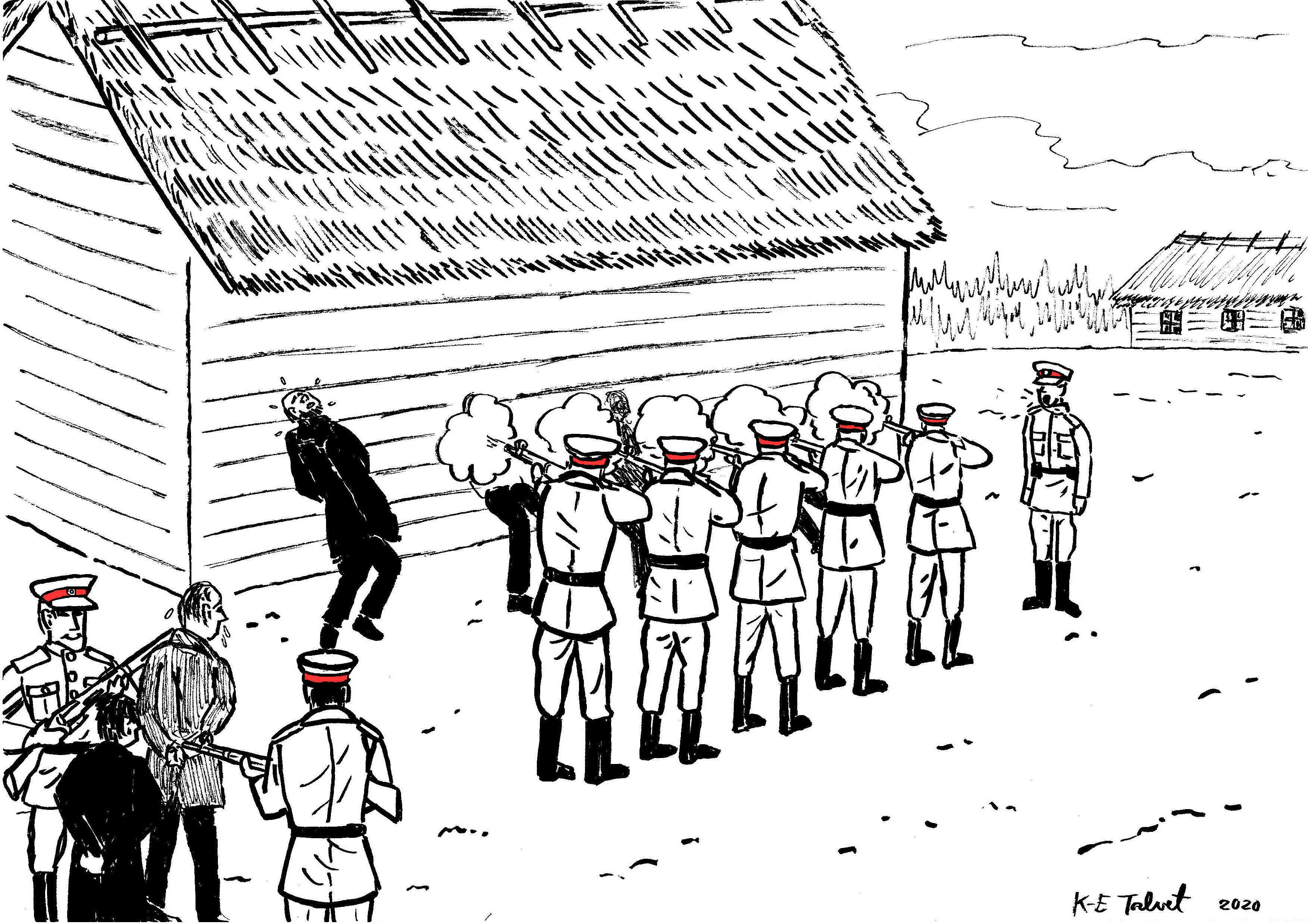
The dictatorship of the proletariat
was established after the victory of the revolution. The Communist
Party’s Politburo ran the state, but an attribute of power was the
compulsory elections at all levels of power with candidates selected by
the Party leadership who belonged to the ‘block of communists and
non-party members’. Election results were rigged in order to achieve the
predetermined result.
Industrialisation, collectivisation and cultural revolution
were the forced modernisation of society for the creation of the
‘material and intellectual base’ for communist society. This meant the
preferential development of industry, especially heavy industry, the
replacement of individual farm holdings with collective farms, and the
subjugation of education, culture and science to communist ideology.
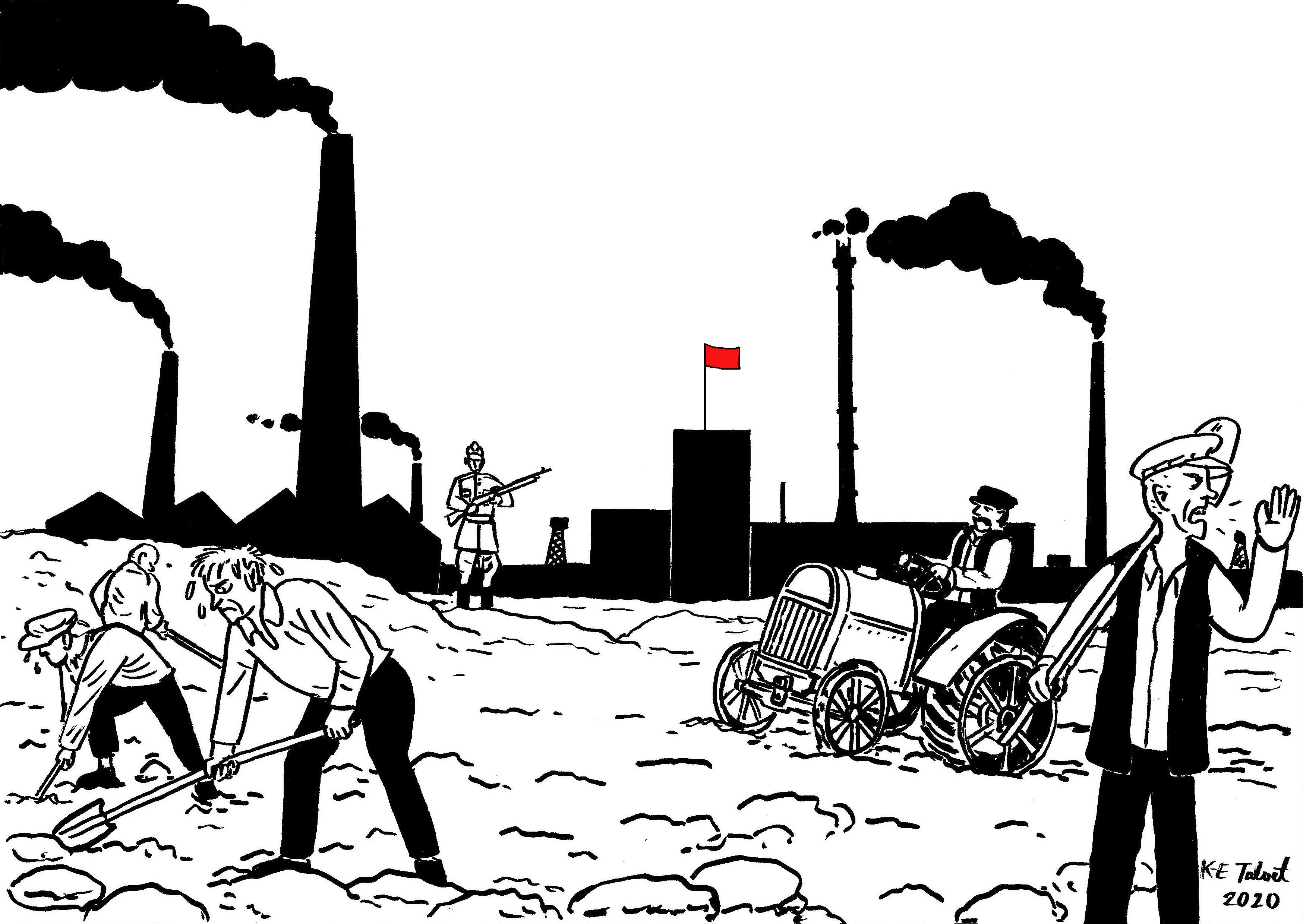
* * *
The German scholars Karl Marx (1818–1883)
and Friedrich Engels (1820–1895) founded the communist ideology.
Communism, the social formation that was to follow capitalism, was to be
built after a violent worldwide revolution starting from the most
highly developed capitalist countries. The most progressive class, the
working class, was to build communism under the leadership of its
avant-garde, the Communist Party, under the conditions of the
dictatorship of the proletariat. The state was supposed to disappear
over time in a communist society.
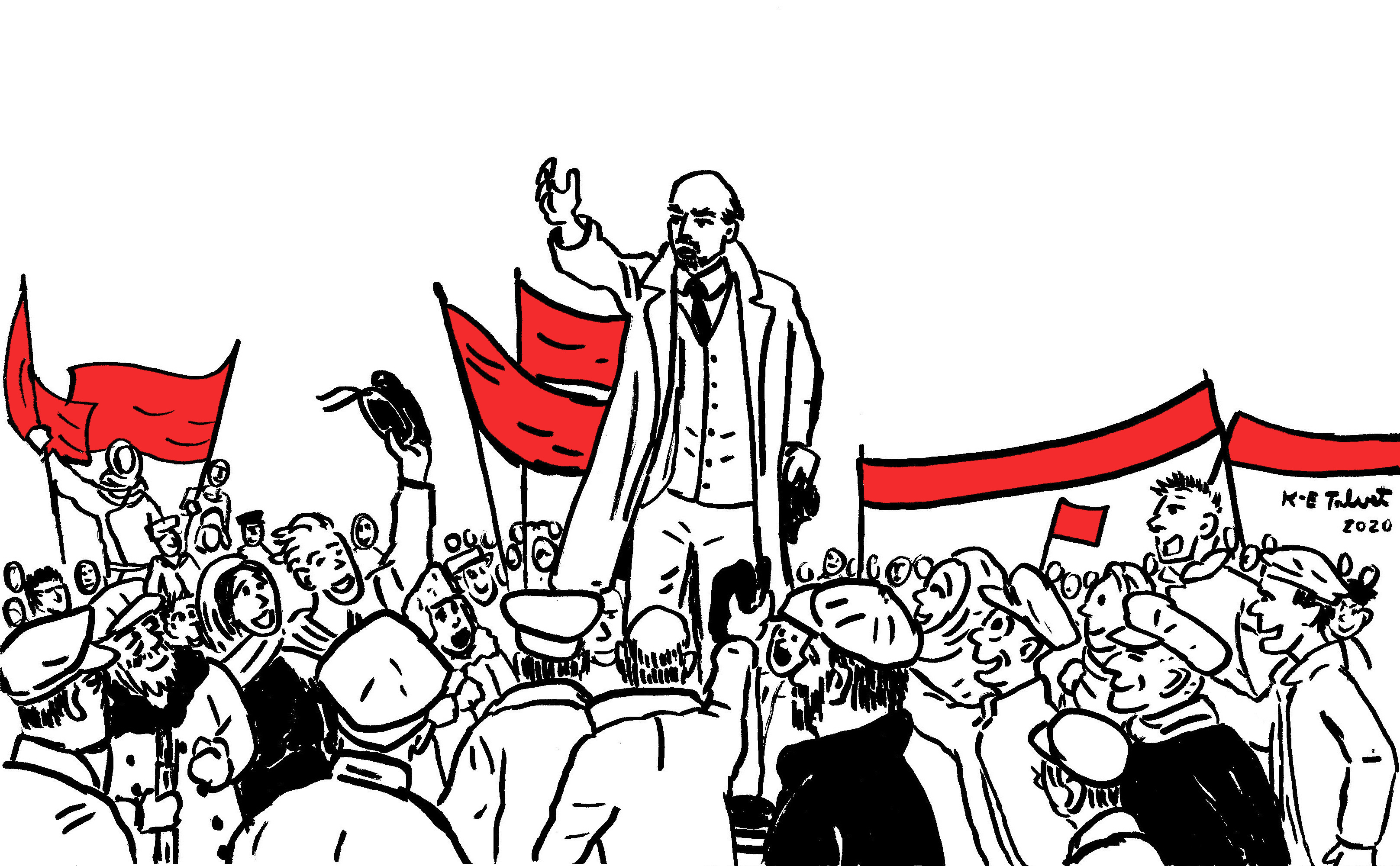
Communists hoped that the worldwide
revolution would break out at the end of World War I. The seizure of
power by the Bolsheviks in Russia in November of 1917 was seen as the
fuse for this revolution. The worldwide revolution did not break out,
but the governments of a Europe worn out by the world war treated many
of the uprisings of workers and soldiers that were led by communists as a
real danger that could lead to such a revolution.
The Comintern founded in Moscow in 1919
was a worldwide organisation. Communist parties throughout the world
operated as its sections. Jossif Stalin (1878–1953), who rose to the
position of leader of the Soviet Union after Vladimir Lenin (1870–1924),
the leader of the Bolsheviks, developed a theory of building socialism
in one country. Socialism was supposed to be a preparatory stage in the
transition to a communist system of society. At the outset of the 1960s,
the leader of the USSR Nikita Khrushchev (1894–1971) announced the
intention to establish communism in the Soviet Union in the 1980s. Yet
the Soviet Union’s economic situation, the ‘material base’ for building
communism on which the principle of distribution ‘from each according to
his abilities, to each according to his needs’ would have been founded,
started worsening instead in the 1970s.
Socialism in the Soviet Union, in turn, was divided into three stages:
1) the building of socialism (1918–1936)
and the dictatorship of the proletariat, when the civic rights of
members of the former ‘exploitative classes’ were restricted;
2) built socialism (1936–1977);
3) developed socialism (1977–1991): the
creation of the public state and the Soviet people, in which hitherto
existing nationalities were supposed to melt into one.
In 1944–1949, the Soviet Union subjugated
the countries of Eastern Europe, where the socialist organisation of
society was established. Communists also came to power in China.
Socialism was established in the form of so-called people’s democracy in
the Eastern European countries. Some miniature political parties
(Christian Democrats, agrarian parties, and others) were allowed to
operate under communist control, and in some countries, small private
land holdings were also allowed (for instance in Poland).
* * *
Communism is an equalising ideology of
redemption with its own original sin (one person’s exploitation by
another) and paradise (communist society). The Party leadership
established the exclusively valid truth of communism. The primary enemy
of the only progressive class, the proletariat, was the exploitative
classes, above all the bourgeoisie. As happens among people of the same
denomination, currents that diverged from the mainstream established by
the Politburo of the Central Committee of the Communist Party of the
Soviet Union (such as Trotskyism, Maoism, Eurocommunism, and many
others) emerged and the supporters of these variants were persecuted.
Communism considered the ascertainment of
alleged laws of the development of human society to be the greatest
achievement of Marx and Engels. Lenin, the leader of the Russian
Bolsheviks, worked out instructions for seizing power and establishing a
communist state based on the texts of Marx and Engels. His successors
developed these instructions further in accordance with changing
conditions. Communism claimed to be a scientific political doctrine,
from which followed its alleged supremacy compared to other political
ideologies. Classical German philosophy, English political economy, and
utopian French socialism were considered to be the predecessors of
communist ideology. The following three components of communist ideology
continued to develop these three fields of knowledge: dialectic and
historical materialism (philosophy), political economy (economic theory)
and scientific communism (politology).
The dogmas of communist ideology were
clear and simple, and students at all levels of education from primary
school to doctoral studies were forced to master them. Other ideologies
were forbidden and the dissemination of texts containing ‘hostile’
ideologies was a criminal offence. Communism is totalitarian by its
nature. Its objective was the subjugation of the whole of society to
ideology and the exclusive leadership of the Party Politburo that
controlled the establishment of that ideology. After the hope for
worldwide revolution had come to nothing and the ‘temporary
stabilisation of capitalism’, the Soviet Union withdrew into itself, as
other communist states likewise did later. Relations between its
subjects and the rest of the world were obstructed.
The former elite was done away with and
partially destroyed, and their property was confiscated. The new elite
consisted of opportunists – many of the revolutionaries in all countries
were members of the ‘exploitative classes’ according to their
background – or people of humble background raised to the fore, who had
rendered services either in revolutionary struggle or in war and whose
education included only that which had been established with communist
ideology.
The building of socialism, as a
prerequisite of the forging of a communist system of organising society,
lay in the forcible and violent modernisation of society. Unlike what
Marx and Engels had predicted, communists came to power in economically
backward countries with a large relative proportion of rural population.
The objective of modernisation was to create the ‘material base’ for
communism: industrialisation (the preferential development of heavy
industry and urbanisation, among other things to enlarge the working
class) and collectivisation (the replacement of individual farm holdings
with kolkhozes and sovkhozes (collective farms), among other things to
decrease the class of peasants who formerly were private owners of farm
holdings).
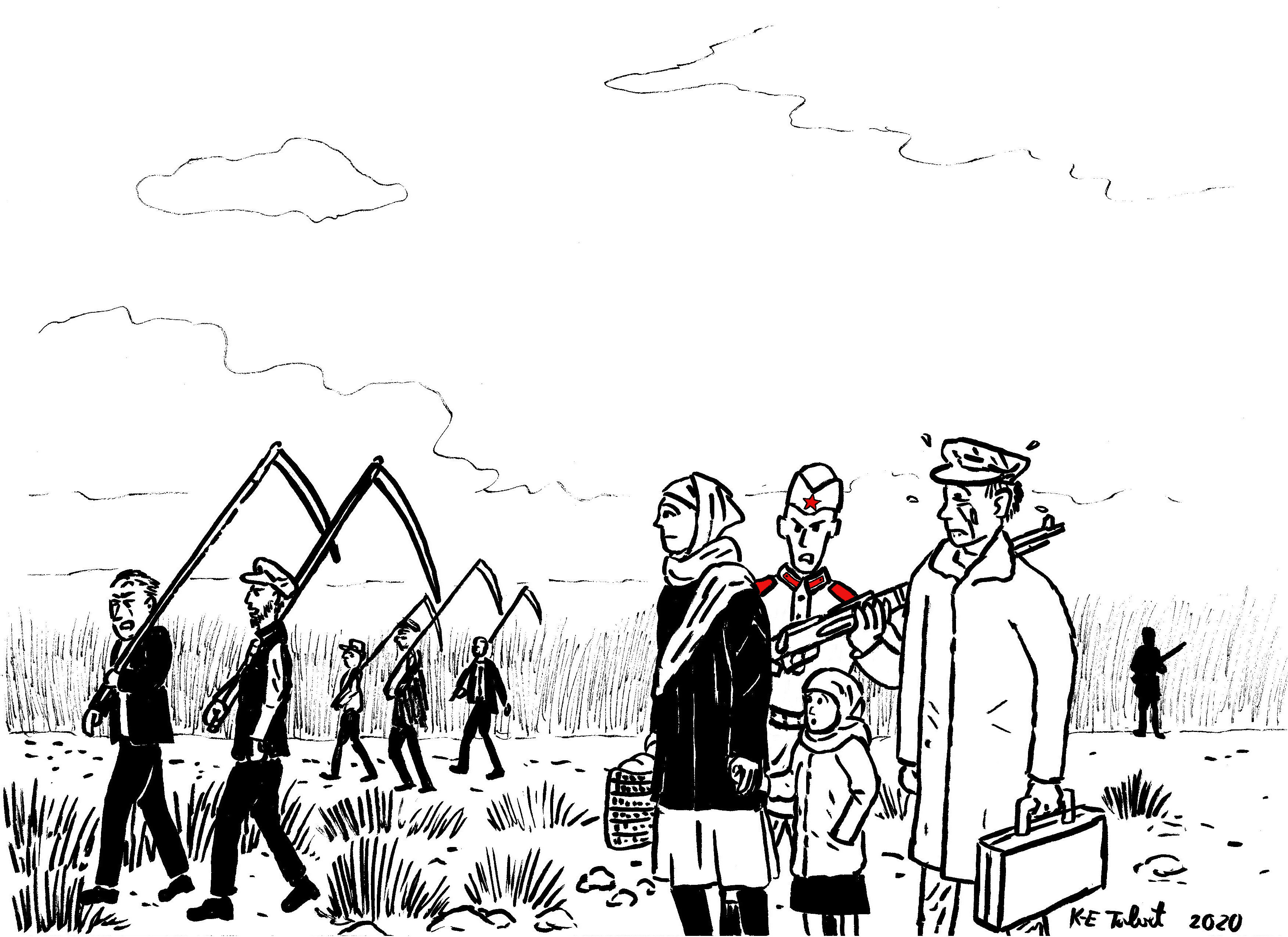
One of the consequences of both policies
was food shortages and famines in many regions, with vast numbers of
victims. The third reorganisation, cultural revolution, lay in the
liquidation of illiteracy and the replacement of hitherto existing
culture with one based on the canons of communist ideology. In science,
natural sciences, the exact sciences and engineering were preferred.
Social sciences were under Party control.
Regardless of its totalitarianism and
thanks to vigorous propaganda, communist ideology often managed to
achieve broad support for a short period of time in countries ruled by
communist parties as well as outside the Eastern Bloc. Declarative
anti-imperialism, anti-colonialism and anti-capitalism enticed European
intellectuals in the 1960s and 1970s.
The Eastern Bloc disintegrated together
with the collapse of the Soviet Union in 1989–1991. Communist parties
did not come to power as a result of the democratic process nor did they
succeed in retaining power when democracy was restored. Communism,
which predicted the future of society according to Western Europe’s
level of development in the 19th century, proved to be wrong. Communist
regimes collapsed into incapacity to provide economic and social
well-being. The Communist Party admittedly rules China, one of the
world’s most powerful countries, to this day, but communist economic
principles have largely been abandoned there.
Communism is a political ideology born in the 19th century that set as its objective the building of a classless society in which all means of production and all that is produced is owned in common by all members of society. Private property is replaced by public property. Communism is totalitarian by its nature. Its objective was the subjugation of the whole of society to ideology and the exclusive leadership of the Communist Party.
The social system based on communist ideology is also referred to as communism, which was supposed to be the ultimate aim of social development.
Communist terror. The first requirement of building communism after the revolution was the confiscation of the property of members of the ‘exploitative’ classes and their suppression, deportation, imprisonment and physical destruction, often together with the members of their families. Tens of millions of people fell victim to it in the 20th century.

The dictatorship of the proletariat was established after the victory of the revolution. The Communist Party’s Politburo ran the state, but an attribute of power was the compulsory elections at all levels of power with candidates selected by the Party leadership who belonged to the ‘block of communists and non-party members’. Election results were rigged in order to achieve the predetermined result.
Industrialisation, collectivisation and cultural revolution were the forced modernisation of society for the creation of the ‘material and intellectual base’ for communist society. This meant the preferential development of industry, especially heavy industry, the replacement of individual farm holdings with collective farms, and the subjugation of education, culture and science to communist ideology.

* * *
The German scholars Karl Marx (1818–1883) and Friedrich Engels (1820–1895) founded the communist ideology. Communism, the social formation that was to follow capitalism, was to be built after a violent worldwide revolution starting from the most highly developed capitalist countries. The most progressive class, the working class, was to build communism under the leadership of its avant-garde, the Communist Party, under the conditions of the dictatorship of the proletariat. The state was supposed to disappear over time in a communist society.

Communists hoped that the worldwide revolution would break out at the end of World War I. The seizure of power by the Bolsheviks in Russia in November of 1917 was seen as the fuse for this revolution. The worldwide revolution did not break out, but the governments of a Europe worn out by the world war treated many of the uprisings of workers and soldiers that were led by communists as a real danger that could lead to such a revolution.
The Comintern founded in Moscow in 1919 was a worldwide organisation. Communist parties throughout the world operated as its sections. Jossif Stalin (1878–1953), who rose to the position of leader of the Soviet Union after Vladimir Lenin (1870–1924), the leader of the Bolsheviks, developed a theory of building socialism in one country. Socialism was supposed to be a preparatory stage in the transition to a communist system of society. At the outset of the 1960s, the leader of the USSR Nikita Khrushchev (1894–1971) announced the intention to establish communism in the Soviet Union in the 1980s. Yet the Soviet Union’s economic situation, the ‘material base’ for building communism on which the principle of distribution ‘from each according to his abilities, to each according to his needs’ would have been founded, started worsening instead in the 1970s.
Socialism in the Soviet Union, in turn, was divided into three stages:
1) the building of socialism (1918–1936) and the dictatorship of the proletariat, when the civic rights of members of the former ‘exploitative classes’ were restricted;
2) built socialism (1936–1977);
3) developed socialism (1977–1991): the creation of the public state and the Soviet people, in which hitherto existing nationalities were supposed to melt into one.
In 1944–1949, the Soviet Union subjugated the countries of Eastern Europe, where the socialist organisation of society was established. Communists also came to power in China. Socialism was established in the form of so-called people’s democracy in the Eastern European countries. Some miniature political parties (Christian Democrats, agrarian parties, and others) were allowed to operate under communist control, and in some countries, small private land holdings were also allowed (for instance in Poland).
* * *
Communism is an equalising ideology of redemption with its own original sin (one person’s exploitation by another) and paradise (communist society). The Party leadership established the exclusively valid truth of communism. The primary enemy of the only progressive class, the proletariat, was the exploitative classes, above all the bourgeoisie. As happens among people of the same denomination, currents that diverged from the mainstream established by the Politburo of the Central Committee of the Communist Party of the Soviet Union (such as Trotskyism, Maoism, Eurocommunism, and many others) emerged and the supporters of these variants were persecuted.
Communism considered the ascertainment of alleged laws of the development of human society to be the greatest achievement of Marx and Engels. Lenin, the leader of the Russian Bolsheviks, worked out instructions for seizing power and establishing a communist state based on the texts of Marx and Engels. His successors developed these instructions further in accordance with changing conditions. Communism claimed to be a scientific political doctrine, from which followed its alleged supremacy compared to other political ideologies. Classical German philosophy, English political economy, and utopian French socialism were considered to be the predecessors of communist ideology. The following three components of communist ideology continued to develop these three fields of knowledge: dialectic and historical materialism (philosophy), political economy (economic theory) and scientific communism (politology).
The dogmas of communist ideology were clear and simple, and students at all levels of education from primary school to doctoral studies were forced to master them. Other ideologies were forbidden and the dissemination of texts containing ‘hostile’ ideologies was a criminal offence. Communism is totalitarian by its nature. Its objective was the subjugation of the whole of society to ideology and the exclusive leadership of the Party Politburo that controlled the establishment of that ideology. After the hope for worldwide revolution had come to nothing and the ‘temporary stabilisation of capitalism’, the Soviet Union withdrew into itself, as other communist states likewise did later. Relations between its subjects and the rest of the world were obstructed.
The former elite was done away with and partially destroyed, and their property was confiscated. The new elite consisted of opportunists – many of the revolutionaries in all countries were members of the ‘exploitative classes’ according to their background – or people of humble background raised to the fore, who had rendered services either in revolutionary struggle or in war and whose education included only that which had been established with communist ideology.
The building of socialism, as a prerequisite of the forging of a communist system of organising society, lay in the forcible and violent modernisation of society. Unlike what Marx and Engels had predicted, communists came to power in economically backward countries with a large relative proportion of rural population. The objective of modernisation was to create the ‘material base’ for communism: industrialisation (the preferential development of heavy industry and urbanisation, among other things to enlarge the working class) and collectivisation (the replacement of individual farm holdings with kolkhozes and sovkhozes (collective farms), among other things to decrease the class of peasants who formerly were private owners of farm holdings).

One of the consequences of both policies was food shortages and famines in many regions, with vast numbers of victims. The third reorganisation, cultural revolution, lay in the liquidation of illiteracy and the replacement of hitherto existing culture with one based on the canons of communist ideology. In science, natural sciences, the exact sciences and engineering were preferred. Social sciences were under Party control.
Regardless of its totalitarianism and thanks to vigorous propaganda, communist ideology often managed to achieve broad support for a short period of time in countries ruled by communist parties as well as outside the Eastern Bloc. Declarative anti-imperialism, anti-colonialism and anti-capitalism enticed European intellectuals in the 1960s and 1970s.
The Eastern Bloc disintegrated together with the collapse of the Soviet Union in 1989–1991. Communist parties did not come to power as a result of the democratic process nor did they succeed in retaining power when democracy was restored. Communism, which predicted the future of society according to Western Europe’s level of development in the 19th century, proved to be wrong. Communist regimes collapsed into incapacity to provide economic and social well-being. The Communist Party admittedly rules China, one of the world’s most powerful countries, to this day, but communist economic principles have largely been abandoned there.
https://communistcrimes.org
'We are no longer afraid': Thousands of Cubans protest against the government
Thousands of Cubans took to the streets across the country on Sunday in an unusual protest in which civilians shouted slogans against the Communist government, such as “We want freedom” and “We are no longer afraid.”
The demonstrations came at a time when Cuba faces the worst economic crisis since the fall of the Soviet Union, an increase in repression against political opponents and a strained health system during a critical stage of the pandemic. Health authorities reported almost 7,000 new cases and 47 deaths — a record for infections and deaths on the Caribbean island of just over 11 million people.
In Miami, hundreds of people gathered in the Little Havana neighborhood in solidarity with the growing protests in Cuba. “I know my family in Cuba is struggling, people are dying. It’s terrible,” Miami resident Christian Guzmán told NBC station WTVJ.
“Right now it’s hard. There’s no food, there’s no medicine. The Covid outbreak. The whole country is in the streets,” another Miami resident, Darío Suárez, said.
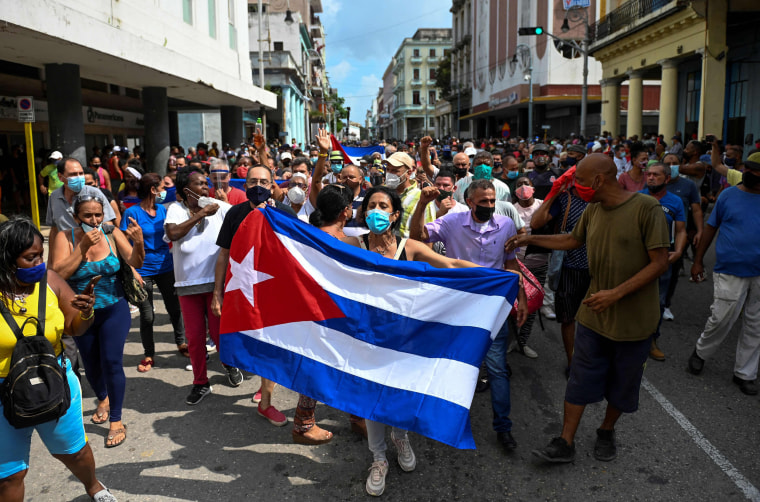
In Cuba, the protests began early Sunday afternoon in the municipality of San Antonio de los Baños, in the Artemisa province, adjacent to Havana. A few hours later they had spread to the east of the country, in provinces such as Santiago de Cuba.
The central Malecón of the capital, where in August 1994 Cubans staged a historic protest against then-leader Fidel Castro that was violently repressed, also saw hundreds of protesters gather on Sunday.
Cubans in several provinces contacted by Noticias Telemundo confirmed that the government, which controls the only internet provider company on the island, has caused service outages to prevent live broadcasts.
“They do not want the world to see what is happening in Cuba,” said a resident from Havana who asked not to be identified for fear of reprisals from the regime.
President Miguel Díaz-Canel appeared on national television to call on the Army to confront the protesters: “The order to fight has been given,” he said.
In Cuba, videos broadcast on social networks, which could be verified by Noticias Telemundo, show special agents known in Cuba as Black Berets, being deployed in some localities and violently detaining civilians who protested and sang peacefully.
Díaz-Canel also called “all the revolutionaries in the country, all the communists, to take to the streets and go to the places where these provocations are going to take place.”
In recent days, Cuban exiles and high-profile personalities have joined the #SOSCuba campaign to demand that the island’s authorities open a humanitarian channel that allows the entry of medicines and supplies to treat the almost 240,000 patients with coronavirus.
Cubans protest over Covid concerns, government frustrations
July 11, 202101:29Cubans whose relatives have died from coronavirus in recent days have gone on social networks to talk about the seriousness of the health crisis, which currently has its epicenter in the province of Matanzas, known for Varadero, a popular beach resort town.
“My mother just died. We were in isolation for four days. Four days calling the SIUM (Integrated System of Medical Emergencies) to come and look for her. Four days and the SIUM did not arrive,” said Magdiel Matos outside a hospital in Matanzas.
Opposition artists and independent journalists have said for weeks that the government has maintained police patrols outside their homes, while reports persist of patients who could not be transferred to hospitals on time due to lack of transportation and resources.
“Take these patrols to transport the sick, open the hotels to house them, facilitate the arrival of donated medicines and medical utensils,” poet and activist Katherine Bisquet said from Havana, pointing out a police car stationed in the basement of the building.
Cuba did not join COVAX, the World Health Organization agency that seeks to disseminate Covid-19 vaccines in poorer countries, instead betting on the production of its own vaccines.
One of those five vaccine candidates, Abdala, received approval for emergency use this week. The government has stated that the vaccine, the first produced in Latin America, is 92.8 percent effective after three doses, but has not published data on clinical studies and it hasn't received the approval of any international health organization.
In Miami, with the largest community of Cuban exiles in the U.S., Cuban-born congresswoman María Elvira Salazar said, “We have not seen in recent years a popular uprising as big as this one.”
Mass protests are rare on the island and, when they do occur, they are quickly put down. Cuban politicians and the official press, the only one allowed by law in Cuba, often discredit dissidents by saying that they respond to the interests of the United States and that they receive funding for subversion.
The acting deputy secretary of the U.S. State Department’s Office of Western Hemisphere Affairs, Julie Chung, defended the protests on Twitter, saying that peaceful protests were growing as people exercise their right to peaceful assembly to express their concern over the increase in Covid-19 cases and deaths.
The coronavirus crisis, which caused the closure of airports and slowed tourism by more than 80 percent — Cuba’s second source of income after its medical missions — has exacerbated the shortage and fueled popular discontent.
The Cuban government attributes the economic crisis to U.S. embargo against Cuba and sanctions, which former President Donald Trump intensified. The Biden Administration has shown no signs of wanting to roll back sanctions, instead demanding that the government release political prisoners and respect dissenting voices.
An earlier version of this story was first published in Noticias Telemundo.
More Information CLIC HERE
#SOSCuba: Florida leaders from both parties back Cuban protestors’ calls for change
As some of the largest street protests seen in decades erupted in Cuba, Florida political leaders in both parties hailed the uprising and declared solidarity with the Cuban people.
Cuba is suffering through its worst economic crisis in decades, coupled with a resurgence of coronavirus cases. The circumstances erupted into massive street protests with thousands of Cubans demanding change.
U.S. Sen. Marco Rubio, a Cuban American and staunch opponent of the Cuban government, is offering running commentary as events unfold. Unlike some other political leaders, though, Rubio took opportunities to scattershot his grievances, aiming his ire as much toward American news organizations and the Biden administration as he did at the Cuban regime.
“The socialist goon squad is now on the street beating peaceful protestors. So far not seeing much interest from US National media outlets,” Rubio tweeted.
He then extended his media critique to Twitter, for an objectionable framing of the events.
“Surreal but not surprising. Twitter says this all about COVID ‘awareness’ in #Cuba. Ignores this is really about how socialism is a disaster & always leads to tyranny, despair & suffering,” Rubio noted.
The Senator was not done.
“It’s 5:36 PM in the east. A historic day of unprecedented protests going on against socialism in #Cuba So far CNN in the U.S. says nothing to see here but gives coverage to the world’s ‘deepest pool’ in Dubai,” Rubio noted.
Rubio’s greatest frustration arguably was from the White House, however.
Rubio tweeted throughout the night, warning of a state response that includes the abduction of opposition leaders and then an official response from the Cuban government that includes a scapegoat.
“Lots of behind the scenes whispering in the regime about the fake President of #Cuba Remember this system always needs a scapegoat. Expect him to appear tomorrow on National TV again with the entire “cabinet” to try & show he has it all under control,” Rubio tweeted overnight.
While Rubio was the most outspoken on this issue as of early Monday morning, many from both parties share his position.
Florida Democratic Party Chair Manny A. Diaz, also Cuban American, condemned the Cuban government’s response as “a call for bloodshed.”
“As I write this, the Cuban government is showing the world that it is nothing more than a repressive tyranny, holding on to a failed and cruel economic and political model,” Diaz said in a written statement. “Miguel Diaz Canel’s orders to beat and arrest peaceful protesters, and his calls for confrontation between his supporters and the protesters are basically a call for a civil war within the island. Make no mistake, this is call for bloodshed, while the country suffers one of its worst humanitarian crises in decades.
“The courageous people of Cuba took to the streets determined to regain their freedom and demand the end of the dictatorship,” asserted U.S. Sen. Rick Scott. “The people of Cuba are not afraid, your time is up!”
“The Biden administration should quickly denounce any detention or violence toward peaceful protestors in Cuba. America & every freedom-loving nation must fully support the brave Cuban people in their calls for liberty & human dignity. The world is watching,” Scott added.
Rubio’s likely opponent in the 2022 U.S. Senate election, Orlando Democratic Rep. Val Demings, declared that Cubans’ future is being decided.”
“The voices of the Cuban people must be paramount. It is their nation’s future being decided. It is my hope that Cuba’s path will be one of democracy and unalienable human rights,” she said in a written statement. “I strongly support the peaceful protesters in Cuba as they struggle for their right to create their own future. I condemn all violent repression of the Cuban people by the current regime. Violence against protesters is unacceptable. The suppression of the free press is unacceptable. The Cuban people, like all people, deserve democracy, liberty, health, security, and prosperity. U.S. policy must support the protesters, their safety, and their right to self-determination.”
U.S. Rep. Mike Waltz was succinct: “#CubaEsUnaDictadura Stand for freedom for its long-suffering people,” the Daytona Republican tweeted.
Gov. Ron DeSantis was unambiguous on Twitter Sunday afternoon.
“Florida supports the people of Cuba as they take to the streets against the tyrannical regime in Havana. The Cuban dictatorship has repressed the people of Cuba for decades & is now trying to silence those who have the courage to speak out against its disastrous policies,” DeSantis tweeted.
At least one Florida Democrat marked the irony, noting DeSantis’ own opposition to protest movements closer to home.
“Says the Governor who pushed through House Bill 1, a bill motivated as a means to silence racial justice protests,” snarked Rep. Anna V. Eskamani on Twitter.
The Lieutenant Governor, meanwhile, delivered a video message.
Senate President Wilton Simpson said “Floridians stand with the people of Cuba today.”
“May their courage and action bring the freedom, dignity and human rights they have long been denied,” the Trilby Republican added.
State Sen. Ileana Garcia offered an apt observation: “Freedom in Cuba is symbolized with the American flag.”
“I stand with our brothers and sisters fighting for freedom against decades of tyranny, repression, misery and countless human rights violations under the communist Castro regime. I pray their courage and strength leads to a free Cuba.,” said Rep. Bryan Avila.
Miami-Dade Mayor Danielle Levine Cava was no less direct in support of the protests.
“We stand united with the Cuban people on the island and across our community at this historic moment in the struggle for freedom, dignity, and basic human rights – may their courageous actions bring about real change and move us closer to the dream of a free Cuba,” Cava, also a Democrat, urged.
Democratic Tampa Councilman Luis Viera was likewise staunchly with the people protesting: “Here in West Tampa to stand in solidarity with Cubans protesting 90 miles from Florida for liberty, food & COVID vaccinations. I’m a proud son of Cuban refugees & am proud to use my voice to support change in Cuba.”
___
Reporting from The Associated Press was used in this post.
More Information CLIC HERE
Protesters in Cuba are calling for the ‘end of the communist state,’ historian says
Backers of the government march in Havana, Cuba, July 11, 2021. Hundreds of supporters of the government took to the streets while hundreds protested against ongoing food shortages and high prices of foodstuffs.
Ismael Francisco/AP
An astonishing scene unfolded in Cuba over the weekend as thousands took part in anti-government demonstrations across the island.
In Bejucal, a town south of Havana, protesters cheered, "Libertad, libertad!" ("Liberty, liberty!")
This was a rare moment in a nation that typically cracks down hard on dissent. Protesters took to the streets to express frustration with food shortages and high prices amid the coronavirus crisis.
Related: US human trafficking report elicits anger from several countries
Cuban President Miguel Díaz-Canel, however, said the demonstrations were stirred up on social media by Cuban Americans in the United States.
Several videos of the protests circulated online throughout the weekend. Hundreds of government supporters also took to the streets in counterprotests.
Historian Lillian Guerra has written extensively about the politics of Cuba and has been following the protests from her home in Gainesville, Florida. She joined The World's host Marco Werman to talk about the significance of the demonstrations over the weekend.
Related: Cuban Americans appeal to Biden over immigration
This interview has been edited and condensed for clarity. AP contributed to this report.
https://www.pri.org



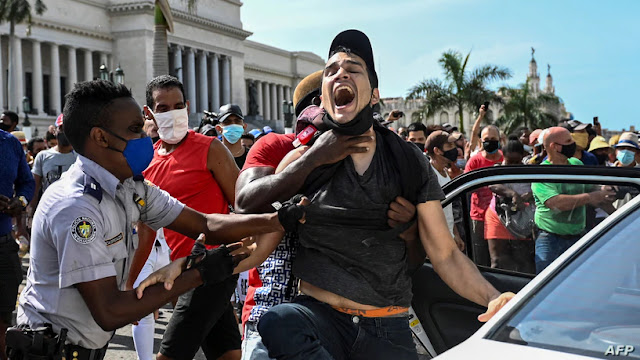


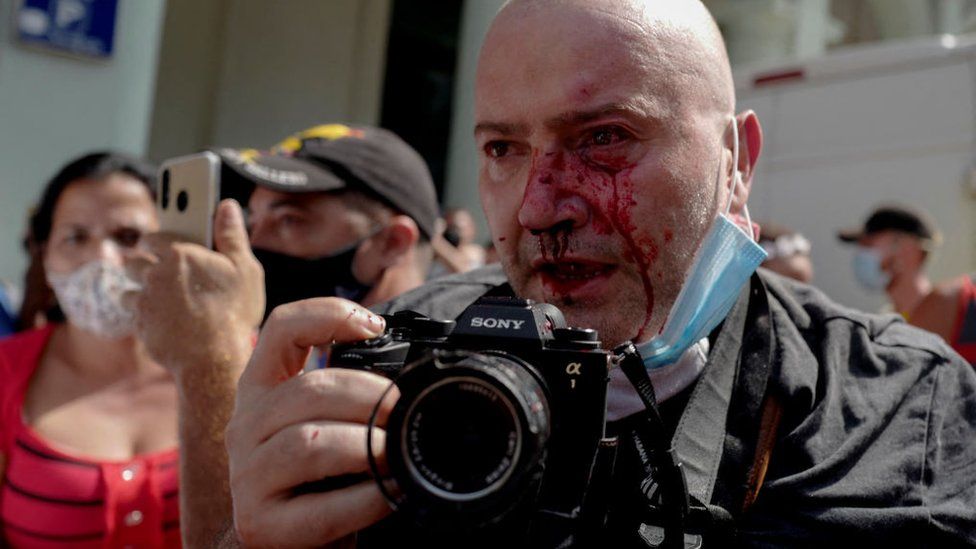
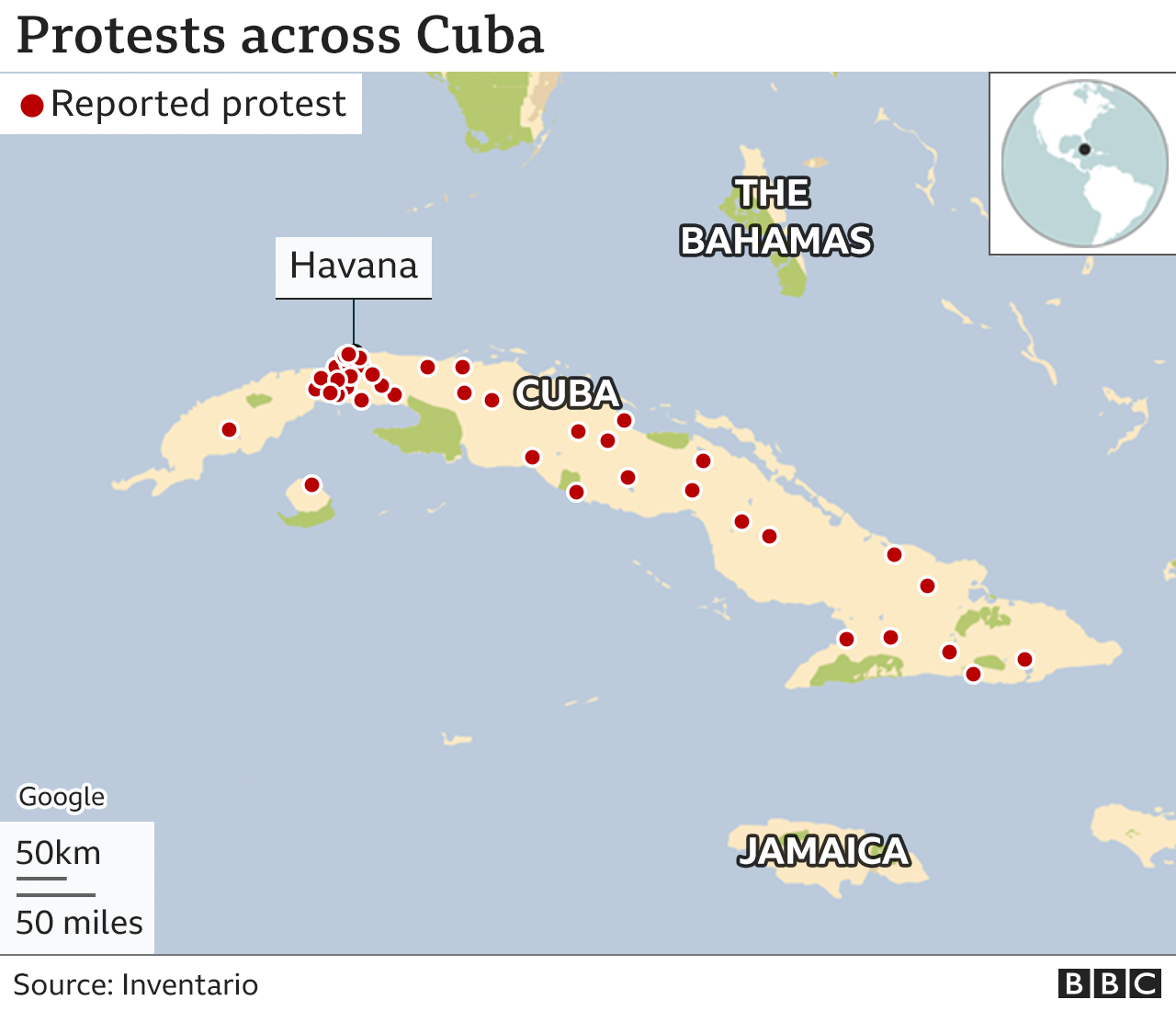
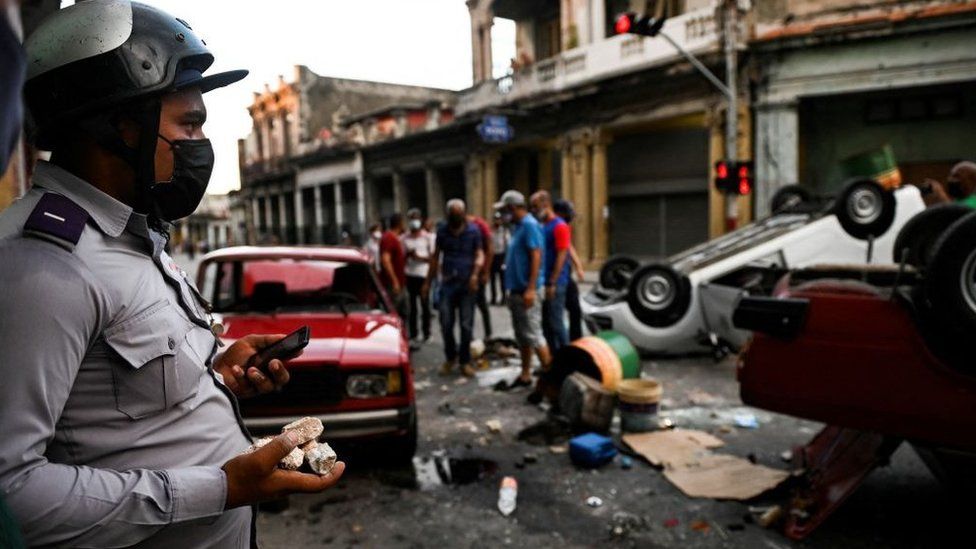



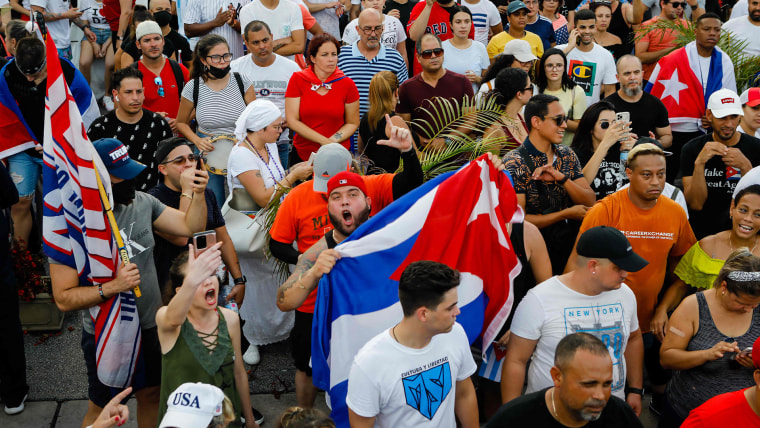
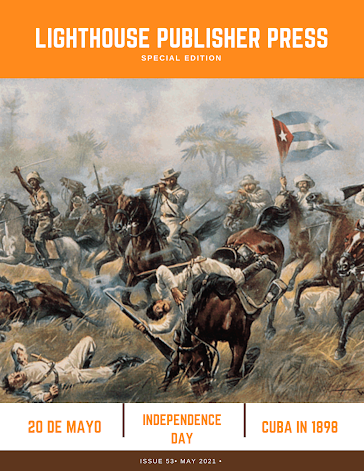
Comments
Post a Comment